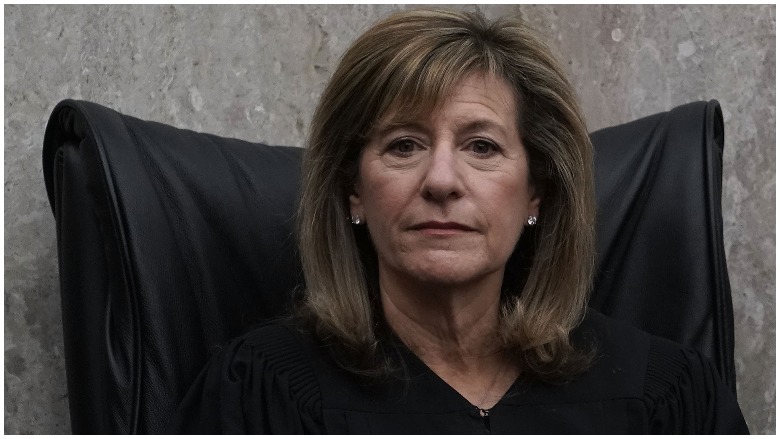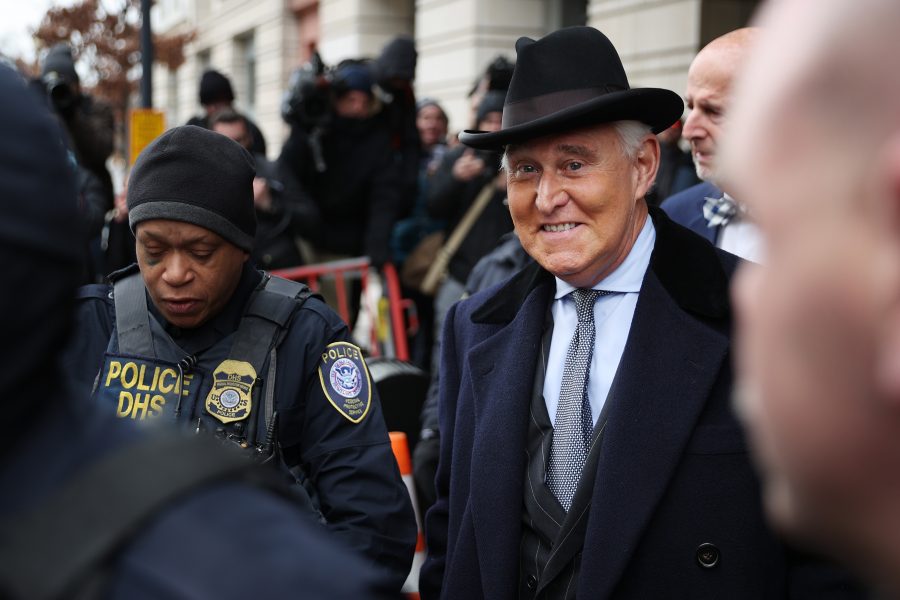
Amy Berman Jackson is the United States District Judge who presided over both Paul Manafort and Roger Stone’s federal cases. She has been serving on the bench since 2011 after the Senate voted unanimously to confirm her.
Here’s what you need to know.
1. Judge Jackson Said Her Decision to Sentence Roger Stone To 3+ Years Behind Bars Was Not Influenced By Politics

Getty Roger Stone leaves court after being sentenced February 20, 2020 in Washington, DC.
In November 2019, a jury convicted Roger Stone on multiple charges that included witness tampering and lying to Congress. Judge Amy Berman Jackson handed down Stone’s sentence on February 20, 2020, for those crimes: 40 months behind bars. It was a significantly lighter sentence than what federal prosecutors initially called for. Jackson also ordered Stone to serve an additional two years of probation once the prison term is over and pay $20,000 in fines.
But the sentence will not go into effect until a final decision is made on whether Stone deserves a fresh trial. Stone’s defense team requested a retrial amid accusations that one of the jurors could have been biased. President Trump raised that accusation on Twitter prior to Stone’s sentencing.
Before announcing the sentence, Judge Jackson insisted her decision was not influenced by any of the political fights going on outside the courtroom. She told the court, “The truth still exists, the truth still matters. Roger Stone’s insistence that it doesn’t, his belligerence, his pride in his own lies are a threat to our most fundamental institutions, to the foundations of our democracy. If it goes unpunished it will not be a victory for one party or another; everyone loses.”
During the course of the trial, Stone risked being sent back to prison for social media posts related to Judge Jackson. In February 2019, Stone posted a photo of Judge Jackson that included crosshairs near her head, in the top left corner. Stone deleted the picture and reposted it without the crosshairs, before deleting it again.
Stone appeared to accuse Judge Jackson of being corrupt and unfairly biased against him in the caption. He wrote, “Through legal trickery Deep State hitman Robert Mueller has guaranteed that my upcoming show trial is before Judge Amy Berman Jackson, an Obama appointed Judge who dismissed the Benghazi charges against Hillary Clinton and incarcerated Paul Manafort prior to his conviction for any crime.” He included a hashtag that read, “Fix is in.”
That message led to Judge Jackson’s decision to tighten Stone’s gag order. In court on February 21, 2019, Stone admitted it had been a lack of judgment to post it and claimed the image was a Celtic symbol. But Judge Jackson decided that the post could have incited others to violence. She barred him from speaking to the media about his case or posting about it on social media. Judge Jackson warned that violating the gag order would mean immediate detention and that he would not get a third chance.

But the social media saga was not over. On March 4, 2019, prosecutors alerted Judge Jackson to an Instagram post sent from Stone’s profile the previous day. It included the words “Who framed Roger Stone?” with his image underneath. The second issue was about the re-release of Stone’s book, “The Myth of Russian Collusion.” The book contains a new introduction that slams Mueller and the investigation as a witch hunt. He wrote the introduction before his arrest in January and the book was published before the complete gag order was imposed.
Judge Jackson criticized Stone and his attorneys in court the following day. She wrote in a court filing, “It does not matter when the defendant may have first formulated the opinions expressed, or when he first put them into words: he may no longer share his views on these particular subjects with the world.” She also slammed his legal team for failing to tell her about the book until after its release. Judge Jackson ultimately decided against ordering Stone behind bars at the time.
2. Judge Jackson Sentenced Paul Manafort to 43 Months In Prison

GettyPaul Manafort.
Judge Amy Berman Jackson oversaw Paul Manafort’s case related to the Russian investigation. She revoked his bail and sent him to prison in June 2018 after prosecutors provided evidence that Manafort had been speaking with at least two government witnesses while he was under house arrest. He was put in a separate wing of the detention center away from other inmates.
During the hearing announcing that she was revoking his bail, Judge Jackson dismissed the notion that her decision was political. The New York Times quoted her as saying, “This hearing is not about politics. It is not about the conduct of the special counsel. It is about the defendant’s conduct.” She added, “This is not middle school. I can’t take away his cellphone.”
In September 2018, Manafort pleaded guilty on charges of conspiring against the United States and conspiracy to obstruct justice by witness tampering. He also agreed to cooperate with Special Counsel Robert Mueller’s investigation.
But in February 2019, Judge Jackson ruled that Manafort had violated his plea deal by lying to Robert Mueller. She decided that there was enough evidence to show that Manafort had attempted to mislead the Special Counsel about his relationship with Russian political operative Konstantin Kilimnik, who is said to have connections with Russian intelligence.
Judge Jackson ultimately sentenced Manafort to 43 months in prison. That order was on top of the nearly four-year sentence he received from U.S. District Judge T.S. Ellis on charges including bank fraud.
Before Judge Jackson handed down the sentence, Manafort apologized to the court, saying that he was “sorry for what I have done.” Reporters inside the courtroom shared that Manafort asked for compassion, and asked the judge to allow him to be with his wife.
The apology did not appear to be enough to sway Judge Jackson. CBS News reporter Steven Portnoy tweeted from the courtroom that Judge Jackson said in part, “It is hard to overstate the number of lies and the amount of fraud and the extraordinary amount of money involved” in the crimes. She reportedly said that Manafort does not deserve leniency and questioned whether Manafort had been truthful with her.
3. Judge Jackson, Who Was Nominated By President Obama, Ruled Against His Administration on the ‘Fast and Furious’ Case
Judge Amy Berman Jackson’s time on the court has included multiple high-profile cases. In 2016 she ruled against the Obama administration in the “Fast and Furious” case. She decided the administration could not invoke executive privilege in order to keep documents related to the operation away from Congress.
Operation Fast and Furious was designed as a sting to track suspects believed to be involved with drug cartels in Mexico. The Bureau of Alcohol, Tobacco, Firearms and Explosives and other law enforcement agencies allowed thousands of illegal gun sales to go through between 2009 and 2011. The idea was to follow the weapon and identify cartel associates.
It was later discovered that two weapons linked to the operation were used during the killing of a Border Patrol agent named Brian Terry. Lawmakers opened investigations into Operation Fast and Furious. In 2012, the House voted to hold then-Attorney General Eric Holder in contempt of Congress for refusing to hand over documents related to the case. A lower court ruled that the documents should remain secret.
But on January 19, 2016, Judge Jackson sided with Congress. She ordered the Obama administration to release thousands of pages of documents to lawmakers. Republican Rep. Jason Chaffetz, who served as chairman of the House Oversight and Government Reform Committee at the time, praised the decision as an “important step forward.”
4. Judge Jackson Dismissed Two Lawsuits Against the Office of Personnel Management Over Massive Data Breaches
Another high-profile case Judge Jackson presided over involved the Office of Personnel Management. Federal officials announced in 2015 that it had been the victim of a cyberattack. An estimated 22 million people’s personal information had been compromised in the data breach.
Judge Jackson ruled on the side of the government and dismissed two cases, one of which was filed by a government employee. The second was a class-action lawsuit. She argued that the plaintiffs did not prove that they had suffered actual harm due to the breach.
5. The Senate Voted Unanimously in 2011 to Put Amy Berman Jackson on the D.C. District Court
Judge Amy Berman Jackson has been on the bench at the D.C. District Court since March of 2011. The Senate vote to appoint her to that position was 97-0. At that time, the Senate was made up of 51 Democrats, 47 Republicans, and 2 Independents.
Before her appintment to the bench, Jackson worked in private practice, according to her District Court bio. She was an attorney at Trout Cacheris in Washington, D.C. Prior to that, she was a partner at Venable, Baetjer, Howard, and Civiletti.
Jackson earned her law degree from Harvard. One of her classmates was current Chief Justice John Roberts. After graduating, she served as a clerk for Judge Harrison L. Winter at the 4th District Court of Appeals. Her resume also includes working as a Assistant United States Attorney, where she prosecuted murder and sexual assault cases.
As referenced above, Judge Jackson is also overseeing the Paul Manafort case. She ruled earlier this month that Manafort had violated his plea agareement and lied to the Special Counsel about his Russian contacts. Manafort is scheduled to be sentenced on March 13. CBS News reported that this means the Special Counsel no longer needs to support a reduced sentence. Manafort faces ten years in prison on conspiracy charges.
